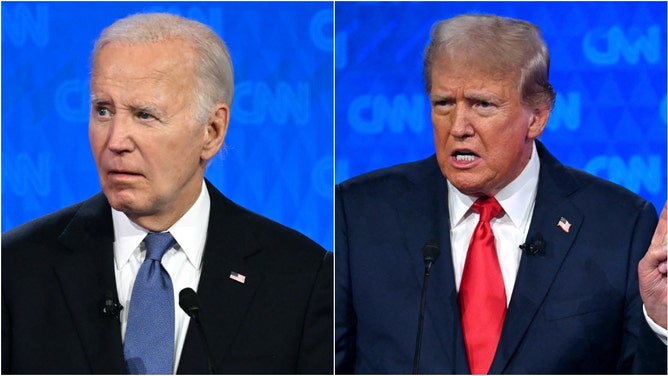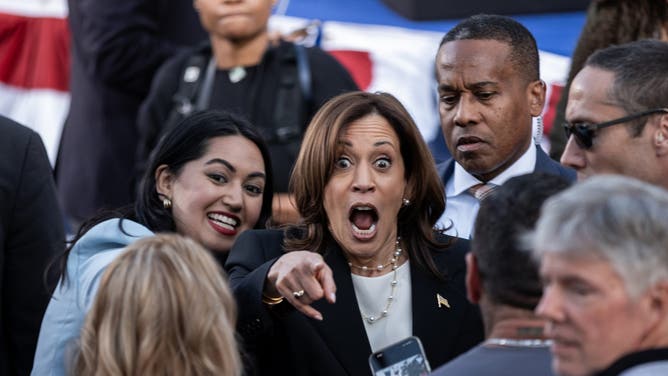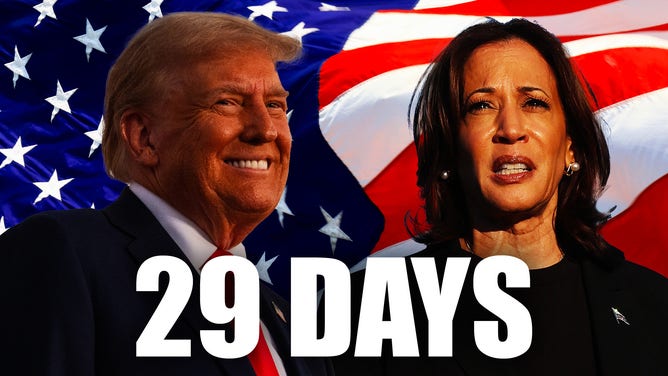Let's Honestly Talk About Who Is Winning The Election: Bobby Burack
Let's talk honestly, without emotions and agendas, about where the 2024 presidential election stands, 29 days out.
I try never to write in the first person. Unless you are writing a story about yourself, the pronoun "I" weakens any argument you attempt to make. But I want readers to know exactly where I'm coming from before my assessment of the election.
I support putting America before every other country on the globe, controlled immigration, closed borders, free speech, and ending senseless wars. The Democratic Party supports none of that.
The party is run like an oligarchy, where the people are trained to defer to unelected bureaucrats who influence the party's funding. The Democratic Party is now the party of censorship, racism, war, and control.
Further, the party is weak on policy. By the numbers, the country was stronger under Donald Trump – from the border to the economy, from peace in the Middle East to energy independence.
And that should be enough for Trump to win in November. But there is an entire machine behind Kamala Harris – from the media to Big Tech, from Hollywood to the deep state.
Where does that leave us? Let's go back to early June, before the first debate.
On June 1, most mainstream polling projected a toss-up election. Neither Trump nor Biden had distanced himself as the favorite. Granted, oft-cited election statistician Nate Silver disputed that notion. He released his first model on June 26, the day before the debate, giving Trump a 65% chance of victory.
Then the debate happened.

Actress Lea DeLaria shared a video calling for President Joe Biden to have Donald Trump murdered. Watch a video of her comments. (Credit: Getty Images)
Part I: The Debate
Joe Biden crumbled. He showed he was finished. The polls agreed, shifting heavily in Trump's favor. Friendly media allies started to apply pressure on Biden to drop out.
Most damningly, leaked internal polling data from the Democratic Party showed Biden trailing in all seven battleground states. The Open Labs data projected a 333-205 win for Trump.
A victory for Trump victory felt inevitable, especially after someone came within a millisecond of assassinating the former president on July 13 during a rally in Butler, Pennsylvania. Not to be short on details, but nearly three months later, the American public is not privy to any concrete information about the attempt on Trump's life.
The 2024 Republican National Convention started two days after Trump was shot. He named Ohio senator JD Vance as his running mate, in an apparent move to establish his political successor. A sense of unification was felt during the convention.
Trump walked on stage that Thursday, bandaged in the ear, in an emotional but comforting scene to accept the nominee. And that's when the momentum suddenly swung.
Donald Trump gave a 92-minute speech. It started off stronger, honoring the victims of the shooting at the rally. But it was too long, meandering, repetitive, and, honestly, exhausting.
Part II: The Coup
Four days later, Democratic chieftains Barack Obama and Nancy Pelosi successfully orchestrated a coup atop the ticket. They conspired with top party donors to freeze further funding of the Biden campaign.
With no choice, Biden bowed out of the race on July 20 and subsequently endorsed Kamala Harris.
In theory, Harris would fare no better than Biden. She ran for the White House in 2020 and had to drop out before January of that year. For three years, Harris was viewed as so unelectable within her own party that there were calls for Michelle Obama and Gavin Newsom to challenge Joe Biden in the primary.
Yet the party was left with no choice.
By late July, Harris was the only candidate who could inherit Biden's $200 million war chest. As a result, the party and media deceptively presented the public with a repackaged version of the vice president. They portrayed her as a strong leader with an unblemished résumé as a prosecutor. Part of the strategy was to avoid interviews and press conferences.
It worked. Americans fell for it.

RIPON, WISCONSIN - OCTOBER 3: Vice President and Democratic Presidential nominee Kamala Harris greets supporters during a rally at Ripon College on October 3, 2024 in Ripon, Wisconsin. The rally comes a day after Harris visited Georgia to assess the aftermath of Hurricane Helene. (Photo by Jim Vondruska/Getty Images)
By August 15, Harris led Trump in nearly every mainstream poll. Notably, voter turnout projections increased from 55% to 65%, showing notable enthusiasm for Harris.
Kamala Harris also tapped into what remains a losing message for the GOP: abortion. See the results of the 2022 midterms.
According to Pew Research, 63% of Americans currently say abortion should be "legal in all or most cases," while 36% say it "should be illegal in all or most cases."
I am with the 36%. However, the discrepancy appears to be a battle of messaging. The Left depicts Republicans as creepy old men who want control over women's bodies and dismiss childless women as worthless. It's a lie. Unfortunately, it's not just liberal women who believe that lie – as the polling suggests.
While a small sample size, I explained on X over the weekend the feedback I get from women in my age demographic – 25 to 40 - on this topic.
"Speaking to a good number of friends who are female and relatively conservative, they privately also bought into the messaging. In their opinions, the GOP is dismissive of women who can’t have children (medical reasons), have had miscarriages, haven't found the right guy, or can’t afford to stay home and/or have kids."
By all accounts, Kamala Harris was the favorite to win the election for most of August. Trump got sloppy. He struggled to stay on (a winning) message. He was overly focused on Harris' race, Joe Rogan, Taylor Swift, AI fakes on social media, etc.
But Harris' momentum started to wane by Sept. 1. The honeymoon period was over. She then gave a speech about economics and, according to the polls, started to lose support.
On Sept. 9, the day before the first Trump-Harris debate, New York Times/Siena polling showed Trump regaining momentum in battleground states. Nate Silver's updated model showed Trump once again in the lead.
Then the second debate happened.

Part III: Who really won the debate?
Even when considering the 3-on-1 ambush from the ABC moderators, Trump was not good on stage. He was defensive, took Harris' bait, was slow on his feet, and spent far too long arguing about crowd sizes.
So we thought.
After the debate, the Will Cain Show on Fox News Digital cited dial testing, a measurement of real-time data collection of closed-ended feedback. The dial testing showed that ordinary Americans, meaning voters, actually thought Trump won the debate.
Hmm.
I dismissed the dial testing at first. So did the polls.
Then more data rolled in.
Quietly, polling has found increased support for Trump since early September. As of publication, the Polymart betting odds show Trump up 8 points on Harris, his largest lead since Biden dropped out.
How could that be? Put simply, the state of Pennsylvania.
Part IV: Pennsylvania
The candidate who wins Pennsylvania is almost certainly going to win the election. And it's Pennsylvania where Harris is hastily losing support.
Fracking might be the reason why.
The Financial Times analyzed last week how voters in Pennsylvania do not trust Harris' stance on shale gas: "The state is a huge shale gas producer — and fertile ground for Trump, who is drawing fervent support from areas that account for a fifth of the country’s natural gas supply, and an industry that employs about 70,000 Pennsylvania."
Specifically, a Philadelphia Inquirer/New York Times/Siena College poll from September 19 found that 48 percent of Pennsylvania voters trusted Trump to do a better job on fracking than Harris, at 41 percent. Pennsylvania voters also say they trust Trump more in terms of the economy.
(Note: Leaked internal polling likely influences the betting market. Public polling is often marred by gamesmanship, like oversampling certain demographics ---like women who support Harris but identify as independent-- to generate the pollster's preferred outcome.)
Trump's newfound momentum in Pennsylvania is enough to consider him a marginal favorite. Yet a new study by CNN has me wondering if his lead is slightly more than marginal.
Last week, CNN senior data analyst Harry Enten, one of the few credible voices still at the network, reported on what remains the most telling survey of an election cycle: the number of Americans who view the country "on the right track."
See, no incumbent party has ever won a presidential election when less than 39% of voters say America is on the right track. Today, only 28% of voters believe the country is.
"It would be historically unprecedented [for Harris to win with these numbers]," Enten concluded. "The bottom line is it looks a lot more like a loser for Harris."
And that's where we are.
Donald Trump is not a lock to win in November. But he's in the best shape he's been since Harris replaced Biden.
The question is whether he can carry that momentum in November. The powers that be will not sit idly by. They will continue to exhaust whatever authoritarian resources they have left to stop Donald Trump from winning the election.
Twenty-nine days to go.